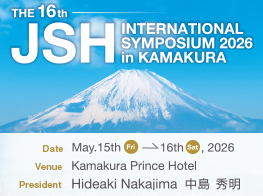
名前:渡邉 達郎【佐賀大学 創薬科学講座】
発表形式:e-Poster
Title:
Aberrant epigenetic regulation through metabolic reprogramming in ATL leukemogenesis
Authors:
Tatsuro Watanabe1, Yuta Yamamoto1, Kazuharu Kamachi1,2, Yuki Kurahashi1,2,3, Nao Yoshida1,2, Hiroshi Ureshino1,2, Yuki Fukuda-Kurahashi1,2, Hideaki Nakamura4, Eisaburo Sueoka5, Shinya Kimura1,2
Affiliations:
1. Department of Drug Discovery and Biomedical Sciences, Faculty of Medicine, Saga University, Japan
2. Division of Hematology, Respiratory Medicine and Oncology, Department of Internal Medicine, Faculty of Medicine, Saga University, Japan
3. OHARA Pharmaceutical Co., Ltd., Japan
4. Department of Transfusion Medicine, Saga University Hospital
5. Department of Clinical Laboratory Medicine, Faculty of Medicine, Saga University
Abstract:
Background: Adult T-cell leukemia/ lymphoma (ATL) is derived from mature T-cells transformed by human T-cell lymphotropic virus type 1 (HTLV-1). Following HTLV-1 infection, it takes decades for carriers to develop ATL. HTLV-1–infected T-cells undergo multi-step leukemogenesis, with accumulation of genetic and epigenetic abnormalities. Trimethylation at histone H3Lys27 (H3K27me3) catalyzed by polycomb-repressive complex 2 accumulates aberrantly in HTLV-1-infected T-cells and its accumulation correlates with ATL development and progression.
We recently identified common differentially hypermethylated positions that are specific to HTLV-1-infected T-cells using comprehensive DNA methylation analysis. The accumulation of DNA methylation at these sites correlated strongly with ATL development and progression (Blood 2020, 136: 871-884). OR-2100, which we developed as a novel decitabine prodrug with enhanced oral bioavailability, suppressed tumor cell growth and global DNA hypomethylation. Taken together, epigenetic abnormalities, especially hypermethylation of DNA and histone H3Lys27, are functionally important for ATL leukemogenesis and represent effective therapeutic targets.
Aims: Here, we aimed to understand how these epigenetic abnormalities accumulate in HTLV-1-infected cells during multi-step carcinogenesis.
Methods: HTLV-1-infected cell lines were cultured in RPMI-1640 medium containing 100 μM methionine. We also prepared modified RPMI-1640 medium with a reduced concentration of methionine. DNA methylation at long interspersed nuclear element-1 (LINE-1), which is a surrogate marker for global DNA methylation status, was determined by bisulfite pyrosequencing. N6-methyladenosine (m6A) in mRNA (m6A RNA methylation) was quantified by ELISA.
Results: Recently, the epigenetic reprogramming that drives T cell differentiation and proliferation was shown to be regulated by the incorporation of extracellular methionine through the amino acid transporter SLC7A5, the expression of which is induced by activation of the T-cell receptor (TCR) signaling pathway. Since several negative regulators of the TCR pathway are silenced by promoter hypermethylation in HTLV-1-infected cells, we hypothesized that epigenetic abnormalities are maintained through sustained SLC7A5-mediated incorporation of methionine in ATL cells.
As expected, we found that SLC7A5 gene expression was higher in HTLV-1-infected T-cells than in normal T-cells using the gene expression datasets GSE55851 and GSE33615. Flow cytometric analysis of SLC7A5 protein expression in peripheral blood mononuclear cells from ATL patients revealed SLC7A5 expression in HTLV-1-infected cells from one of 10 ATL patients (Fig. A). Two HTLV-1-infected cell lines, MT-2 and MT-4, also expressed high levels of SLC7A5 protein. Methionine restriction suppressed the growth of HTLV-1-infected cell lines. As expected, DNA and RNA hypomethylation was induced by methionine restriction (Fig. B, C). A decrease in H3K27me3 and protein arginine methylation was also confirmed by western blot analysis (Fig. D). To understand better the epigenetic responses to methionine restriction, we are performing multi-omics analysis using transcriptome, DNA methylome, histone methylome and metabolome data.
Summary/Conclusion: Based on these results, we think that the epigenetic state of some HTLV-1-infected cells is regulated by methionine metabolism. Targeting methionine incorporation or metabolism to change epigenetic reprogramming could constitute a novel therapeutic strategy for the treatment of ATL.
The EHA2021 受賞レポート
この度は、EHA2021 Virtual Congressへの参加に際しまして、JSH Abstract Achievement Award for The EHA2021 Virtual Congressの受賞を賜りましたこと、厚く御礼申し上げます。今回のEHA CongressはCOVID19の感染拡大を受けて、昨年に引き続き、オンラインでの開催となりました。Face-to-Faceでの討論や学会会場の雰囲気を楽しむことは出来ませんでしたが、オンラインならでは良さも実感できた大変有意義な学会参加となりました。例えば、ほとんどの演題がOn-Demandで配信され、8月15日まで閲覧が可能となっております。これまでの学会では興味のある演題の発表時間が重なってしまうと、どちらか一方を選ばなければなりませんでしたが、On-Demand配信のため、全ての演題が聴講可能でした。英語が得意ではない私にとって、難解な箇所は繰り返しの視聴ができたことも大変有難かったです。また、広大なポスター会場を彷徨いながら、目当てのポスターを探す手間も無く、快適にポスターを閲覧できました。海外出張に掛かる時間的、金銭的、体力的負担が無くなることもオンライン開催のメリットかと思います。
私どもの研究室では、血液腫瘍におけるエピゲノム異常、特にDNAメチル化異常を標的としたDNA脱メチル化療法を研究しており、大原薬品工業株式会社、国立がん研究センター研究所と共同で新規のDNA脱メチル化剤OR-2100の開発を行っております。私どもは昨年、成人T細胞白血病・リンパ腫(ATL)の発がん過程において、原因となるHTLV-1に感染したT細胞に特徴的なDNAメチル化亢進異常が蓄積することを明らかにいたしました(Watanabe T et al., Blood 2020, 136: 871-884)。今回のEHA CongressではHTLV-1感染細胞において、エピゲノム異常が形成、維持される機構について、代謝産物が基質として利用されるメチオニンの関与を検討した結果を『Aberrant epigenetic regulation through metabolic reprogramming in ATL leukemogenesis』としてe-posterにて発表いたしました。
私はEHA Congressに今回初めて参加いたしました。シンポジウムや口頭発表は内容の濃い素晴らしい演題が多く、発表についていくことに必死でした。血液腫瘍研究の最前線に触れることができ、私もより一層精進しなめればと、研究のモチベーションが刺激される有意義な学会参加となりました。今回このような大変貴重な機会を与えてくださいました日本血液学会事務局,日本血液学会 賞等選考委員会の方々、研究を支えて頂いております全ての方々に心より感謝申し上げます。



